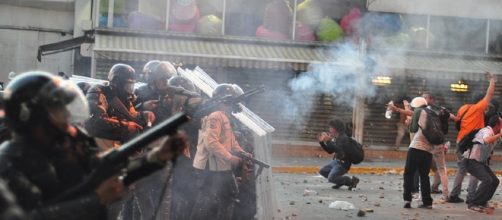The sham elections in Venezuela, which established a so-called National Constituent Assembly that is expected to give President Nicolas Maduro unlimited dictatorial powers, is eliciting a sharp response from the United States. Undeterred, Maduro is arresting his political opponents and is continuing a bloody crackdown in the streets. The development constitutes a new foreign policy headache for the Trump administration, a burgeoning Humanitarian Crisis, and the prospect of a Cuba-style dictatorship aligned with Iran in South America. The White House is examining its options.
Economic sanctions imposed
The United States has imposed economic sanctions against Maduro and his inner circle. The administration is mulling further sanctions, aimed at that country’s oil exports, which still flow into American markets.
The problem is that the economy of Venezuela has all but collapsed, with shortages of everything, including food, ravaging that country’s population. The situation constitutes the end game of socialism. However, economic sanctions would fall heaviest on the ordinary people, whose welfare Maduro has demonstrated a lack of care for. Somehow, a policy has to be devised that will drive the dictator out of power and restore democracy.
Military intervention?
Direct military intervention against Venezuela is likely not in the cards.
Americans have little stomach for foreign military adventures. Also, the long history of American intervention in the affairs of Latin American countries makes such a move diplomatically problematic.
Likely, the United States will attempt to coordinate with the Organization of American States for any kind of military option.
Venezuela’s neighbors are certainly aghast at the idea of a turbulent dictatorship in their midst. However, a direct invasion by a South American coalition would be challenging at best, especially if the Venezuelan military resists it.
The best outcome in Venezuela would be an internal rebellion driving Maduro from power. The opposition not only faces the armed and security forces but militias not shy of shooting people.
The trick would be to even the odds and start delivering arms to the opposition, transforming the street protests into an insurrection.
The other gambit the United States could employ would be to identify elements of the Venezuelan military willing to rise against Maduro. That move may be a tough one. The top leadership of that country’s armed forces is comprised of Maduro cronies.
Nevertheless, the situation in South America cannot be allowed to fester further. Besides the humanitarian crisis, with Venezuelans starving and dying from lack of basic necessities, the presence of a dysfunctional dictatorship on the northern coast of South America would destabilize the Western Hemisphere. The question is how to rectify the situation without making things worse.


